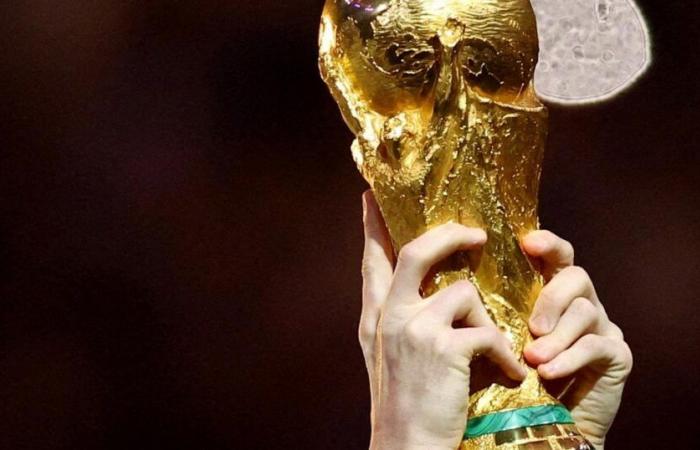Spain-Morocco-Portugal and a pinch of South America for the 2030 World Cup, then Saudi Arabia in 2034: Fifa awards this Wednesday the next two editions of its premier competition.
An unprecedented team then a new welcoming land for Football with affirmed ambition. If this double decision is put to the vote this Wednesday, during a virtual Congress of the supreme body of world football, all suspense has evaporated since the two files found themselves alone in the running last year for each edition .
The “Centenary World Cup”which will celebrate the century since the first Uruguayan edition in 1930, turned into a geopolitical soap opera before leading to an unprecedented agreement between confederations.
Also read
Football: the 2030 World Cup on three continents, the controversy is growing
The British Isles had shown interest before retreating to Euro-2028, South Korea for a time considered a joint candidacy with China, Japan and North Korea, four South American countries launched from 2019 and UEFA touted a Spain-Portugal-Ukraine marriage at the end of 2022, “message of solidarity and hope” after the Russian invasion.
But last year, Ukraine was discreetly disembarked when Morocco joined Spain and Portugal, then South America withdrew in exchange for a symbolic donation: the organization of the first three matches of the tournament in Uruguay, Paraguay and Argentina.
A giant stadium with 115,000 seats in Morocco
After these “Centenary celebrations” scheduled for June 8 and 9, 2030, in the cool of the southern winter, the six teams concerned and their supporters will have to cross the Atlantic for the 101 other matches of the competition, from June 13 to the final, on July 21.
With 11 of the 20 stadiums proposed, Spain should be the main host after having already hosted the 1982 World Cup, but Morocco, five unsuccessful candidates for the organization of the tournament, will become the second African country to host the jewel after the South Africa in 2010.
Also read
Football: Macron wants Morocco’s hosting of the 2030 World Cup to be a “success”
Spain and Morocco are still competing for the opening match, and the final, respectively offering the Santiago Bernabeu in Madrid or the Camp Nou in Barcelona and the future Hassan II enclosure between Casablanca and Rabat, which aims to become the “largest stadium in the world” with 115,000 places.
Portugal, organizer of Euro-2004 but never associated with a football World Cup, for its part offers the two stadiums in Lisbon and that of Porto, and is seeking one of the semi-finals.
Invoking the principle of continental rotation, Fifa had limited its call for applications for the 2034 edition to the Asian and Oceanic confederations, carried out briskly in a short month in the fall of 2023.
Moved again in winter?
And Saudi Arabia, the emerging superpower of world sport, found itself the only candidate after the withdrawal of Australia and Indonesia, and the shelving of China's footballing ambitions.
The Gulf kingdom, launched in a diversification strategy to prepare for the post-oil era, currently only has two of the 14 stadiums with a capacity of at least 40,000 spectators required to accommodate the 48 qualified teams.
Beyond the logistical challenge, the scorching summer could force the competition to be moved to winter or late autumn, as during the 2022 World Cup in Qatar, but we will have to deal with Ramadan, which will begin at the end of December this year. there.
Human rights fears
Above all, the planned designation of this ultraconservative country was greeted by a concert of criticism, Amnesty International and the organization Sports and Rights Alliance (SRA) even calling on Fifa, on November 11, to “interrupt the application process”.
Concerns focus on the exploitation of migrant workers, who will be mobilized en masse to upgrade infrastructure, but also on the future displacement of residents and discrimination likely to affect supporters.
Human rights fears do not spare the 2030 edition either: Amnesty and the SRA call for a credible strategy “to protect players and supporters against discriminatory violations, prevent the excessive use of police force and safeguard the housing rights of residents”.
And, at the beginning of September, Brazilian striker Vinicius Junior suggested entrusting the tournament to a country other than Spain if it does not fight against racism in its stadiums.






